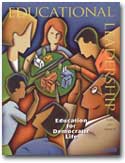Here is a passion for teaching and learning that doesn't let scarcity of resources and local concerns become barriers." That was our primary response as we members of ASCD's Executive Council visited schools, talked with educational leaders and students, and met with government officials on the Caribbean island of Curacao.
To further ASCD's goal of internationalization, the Executive Council holds one meeting each year outside the United States. ASCD members in Curacao hosted us in November. The hectic schedule we followed meant exhausting days, but we gained a special appreciation for the ways Curacao educators are constantly striving to improve practices.
Curacao is one of five islands that make up the Netherlands Antilles. (The others are Bonaire, Saba, St. Eustatius, and the southern part of Saint Martin.) Curacao is 35 miles from the coast of Venezuela, which has influenced the island through an influx of Spanish culture and the establishment of a large oil refinery to process Venezuelan oil. The island's population of 160,000 people represents nearly every nationality and race in the world. Here, diversity of peoples is expected and embraced.
Education officials in Curacao told us that educational practices must help the island build a strong economic base. The high dropout rate parallels the high unemployment statistics of the island. Only 8 percent of students leave the island to pursue higher education, generally in the Netherlands.
The Language Factor
Three major issues shape the way education is delivered in Curacao. One is language. The major language spoken is Papiamentu, a mixture of Dutch, Portuguese, Spanish, and African languages. The language of instruction shifts from Papiamentu to Dutch in the primary schools. This switch from their native tongue is difficult for some students, as Papiamentu continues to be spoken in the home and among the young people socially. In elementary school, Papiamentu is only taught two and a half hours a week. The other subjects are all taught in Dutch.
Paul de Rooy, an ASCD member from Curacao, explained the problem this way:The greater part of the Curacao population (83.2 percent) speak Papiamentu, their native tongue; 8.6 percent (10,000 persons) speak Dutch; 3.6 percent speak English; 3.1 percent speak Spanish. Children from Papiamentu-speaking homes have relatively poorer scores in the Dutch language education system than children from Dutch-speaking homes....To acquire a good command of any language, one must listen to it frequently, read it, and practice regularly. In addition, those who teach the language should do so enthusiastically. They must have a full command of the language. It is in these very aspects that our teachers lack the necessary strength.
Curacao ASCD has launched a campaign to have Papiamentu taught in the early primary grades (at least) until a firm language base is established. Others on the island, however, see Papiamentu as having little value, as it is rarely spoken in other parts of the world. They want students to be taught in more languages so they can compete for jobs throughout the world. Another concern is the expense of producing textbooks and other printed materials in the native language.
Layers of Government
A second major issue that affects the education system is the two layers of government. The central government for the Netherlands Antilles is located in Curacao and consists of a governor, ministers, and the parliament. The Minister of Education is responsible for curriculum content and the qualifications of teachers. In addition to the central government, Curacao has an island government, which includes the Commissioner of Education, who regulates the financing of education.
School boards are responsible for the operation of schools. There are several school boards; the Roman Catholic Board is the largest. There is also a Public School Board. In Curacao, 80 percent of the schools are private and the rest public. All are funded by the government, and parents are given a choice in which school their children will attend.
These layers of educational governance and decision making are complex, as each layer has disparate responsibilities. There is no single authority for education.
Scarcity of Resources
The third major issue is scarcity of resources. As compared to other salaries in Curacao, teacher salaries are high, but they are low compared to teachers' salaries in Europe. Supplies, materials, and equipment are in short supply in most schools. In general, the principal of a primary school gets 75 guilders ($60) per year for each student to purchase materials. In secondary schools, the figure is 125 guilders ($100) for each student. The principal also gets about 1,000 guilders ($800) per year per classroom for all maintenance costs, including electricity and water. Textbooks are often 30-40 years old and in poor shape.
Positive Attitudes
In spite of funding limitations, education in Curacao is changing. At the secondary level, the five-year general education model and the six-year college preparatory program are being integrated. Plans to merge separate vocational programs will eliminate rigid tracking of students. Students already spend extensive time in vocational practice as opposed to seat-time study. High standards have been established for preprimary education.
Educators in Curacao don't use low funding as an excuse; they maintain a positive attitude toward learning, which is instilled in students. Students show respect toward their teachers and toward one another, we noted.
We Executive Council members will fondly remember this study of the Curacao education system. The eager, friendly faces of the students, the collaborative teams of teachers and administrators, the openness of government officials in discussing issues, and the hosting of our visit by Curacao ASCD members will remain pleasurably imprinted in our minds. This visit, like other international visits, gives us the knowledge and power to achieve the goals in ASCD's strategic plan for improved services and commitments to our members worldwide.
